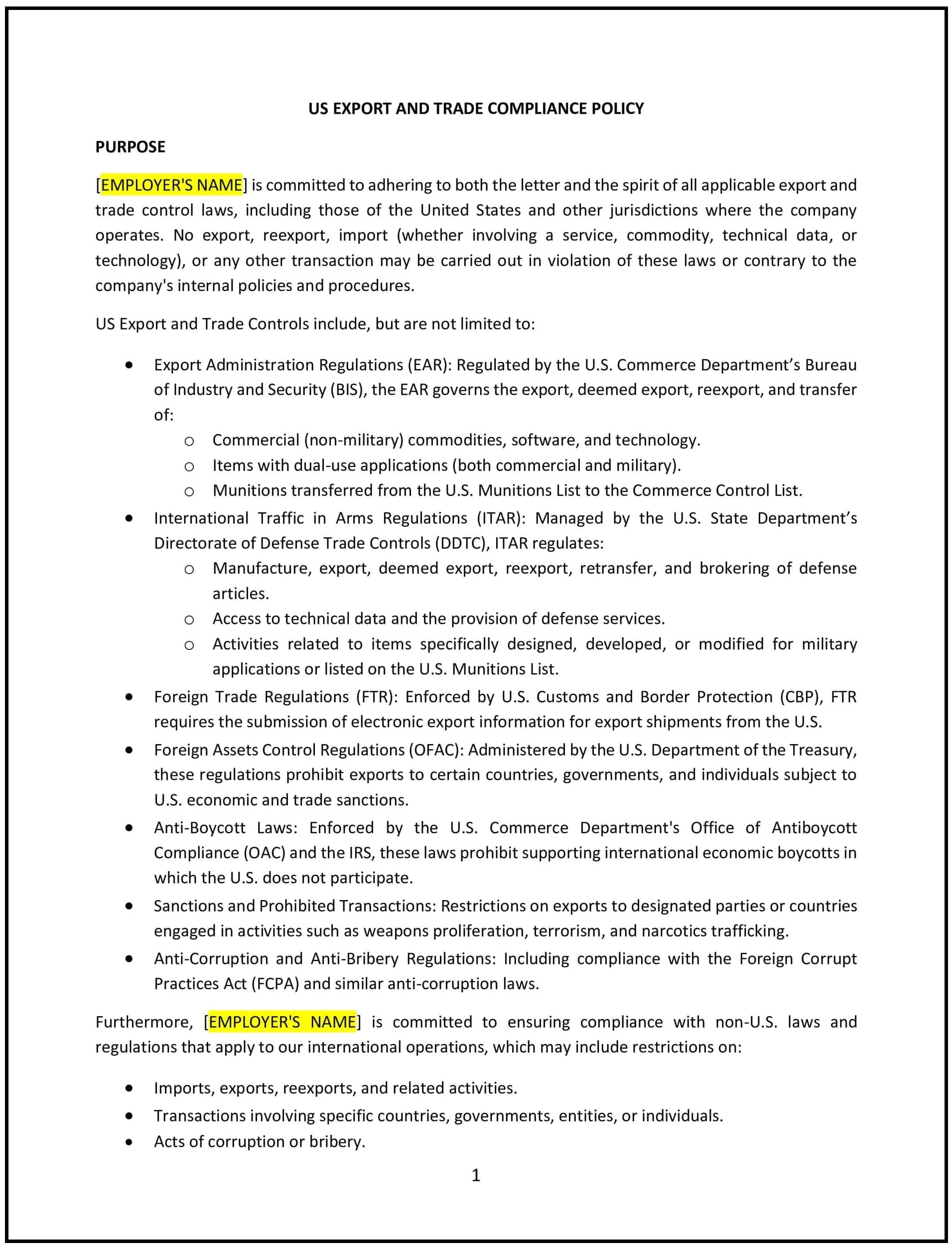US export and trade compliance policy (Maryland): Free template
Got contracts to review? While you're here for policies, let Cobrief make contract review effortless—start your free review now.

Customize this template for free
US export and trade compliance policy (Maryland)
This US export and trade compliance policy is designed to help Maryland businesses comply with federal laws and regulations governing international trade, including the export of goods, services, and technology. It outlines procedures for adhering to the U.S. Department of Commerce, the U.S. Department of State, and other relevant agencies' regulations related to exports, sanctions, and trade restrictions.
By adopting this policy, Maryland businesses can mitigate risks associated with non-compliance and protect their business interests.
How to use this US export and trade compliance policy (Maryland)
- Define export-controlled items: Specify the types of goods, services, technology, or software subject to U.S. export controls, including any sensitive or restricted products.
- Outline compliance procedures: Detail the steps employees must take to ensure compliance with U.S. export regulations, including reviewing transaction details, obtaining licenses, and ensuring proper documentation.
- Address trade restrictions: Clarify the rules regarding trade with countries, entities, or individuals subject to U.S. sanctions, and establish procedures for ensuring prohibited transactions are avoided.
- Establish training requirements: Ensure that employees involved in international trade or export activities receive regular training on U.S. export laws and compliance procedures.
- Provide internal controls: Set up internal processes for monitoring transactions, reviewing export classifications, and documenting export activities for auditing purposes.
- Reflect Maryland-specific considerations: Address any state-specific legal requirements, industry standards, or practices that pertain to trade and export compliance.
Benefits of using this US export and trade compliance policy (Maryland)
Implementing this policy provides Maryland businesses with several advantages:
- Reduces legal risk: Helps mitigate the risk of fines, penalties, or other legal consequences from non-compliance with U.S. export and trade regulations.
- Enhances due diligence: Establishes clear procedures for ensuring that all international transactions are compliant with U.S. laws, reducing exposure to trade-related risks.
- Protects business reputation: Demonstrates a commitment to legal compliance and ethical trade practices, maintaining the company’s credibility with customers, partners, and regulators.
- Improves operational efficiency: Standardizes processes for reviewing and approving international transactions, ensuring compliance is integrated into daily operations.
- Supports global expansion: Helps businesses expand internationally while remaining compliant with U.S. regulations and avoiding penalties.
Tips for using this US export and trade compliance policy (Maryland)
- Communicate clearly: Ensure all employees involved in international trade are familiar with the policy and their role in maintaining compliance.
- Conduct regular training: Provide employees with periodic training on U.S. export controls, trade sanctions, and how to handle potential compliance issues.
- Implement a compliance program: Develop a formal compliance program that includes regular audits, risk assessments, and corrective actions to address non-compliance.
- Monitor regulations: Stay updated on changes to U.S. export laws, sanctions, and trade restrictions to ensure continued compliance.
- Keep accurate records: Maintain comprehensive records of export transactions and compliance documentation for auditing purposes and regulatory reporting.